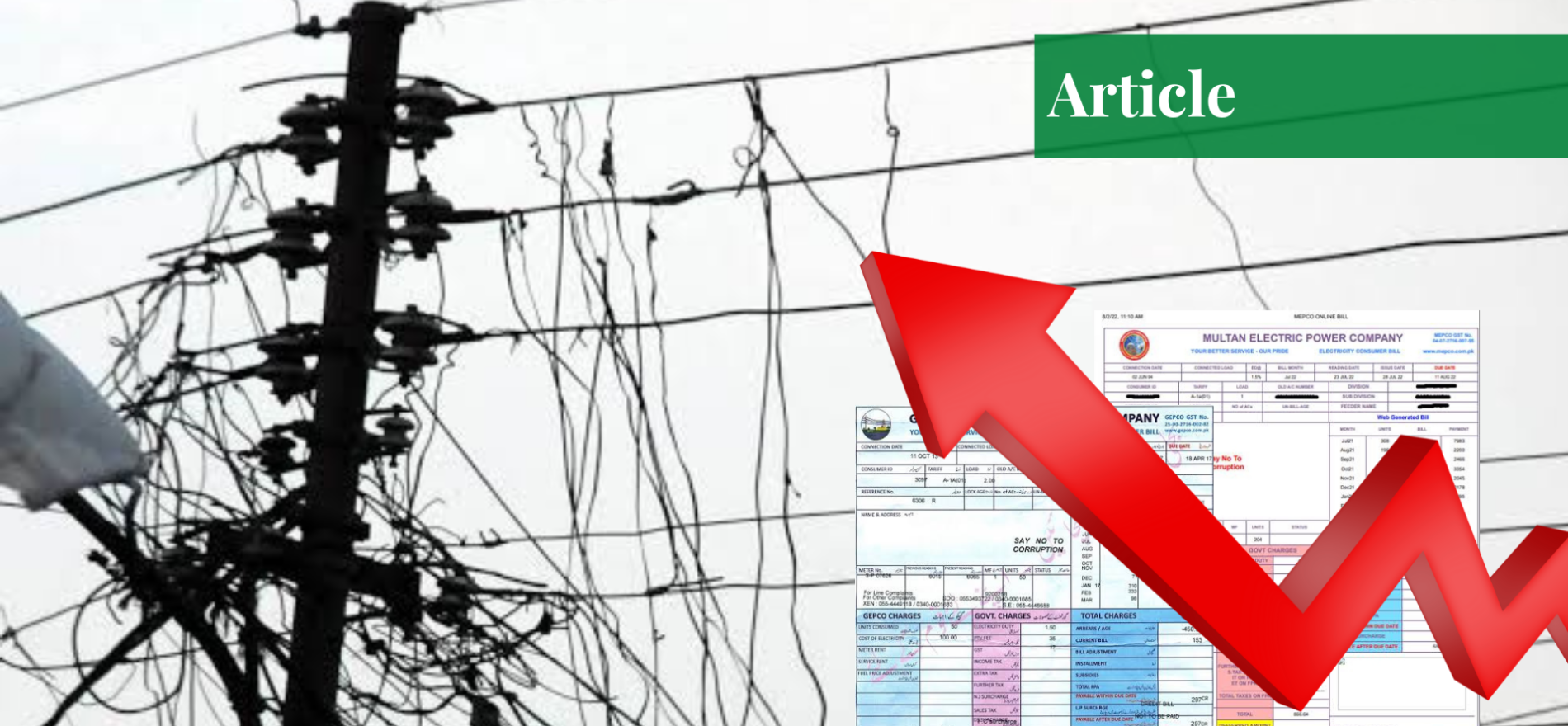Sadia Iqbal is an MPhil candidate and a researcher interested in global geopolitical issues. She is also a gold medalist in the 2020 MA batch of Punjab University.
Electricity Theft in Pakistan
Pakistan has been facing political upheaval, economic instability, and social unrest in recent decades. One of the factors contributing to this crisis is the widespread theft of electricity, also known as the “kunda system.” Although there are multiple methods of electricity theft such as bypassing the electricity meter connection, reverse meter counters, directional changes, etc., wire-tapping (kunda) is the most common method used for it in Pakistan.
The kunda system involves the unauthorized or illegal connections of wires to the power lines, bypassing the meters to avoid paying the bills, while a shortage of electricity in Pakistan with frequent load shedding and power outages is affecting millions of people. Before analyzing the negative impacts and suggesting measures to curb this, it’s crucial to understand the underlying causes of electricity theft—the reason why people are able to execute such blatant theft. We may categorize this enabling environment into two categories: undetectable transmission losses and social reasons.
Undetectable Transmission Losses
Usually, two types of line losses are faced during the transmission of electricity: technical losses and non-technical losses. Technical loss occurs due to the physical structure’s properties, whereas non-technical losses are difficult to measure. Power companies have no recorded information to measure the latter losses. According to NEPRA,13.5% of line losses are considered a justified limit, whereas various power companies confirmed that line losses cross the justified limit in Pakistan’s energy sector.
Given that electricity is also lost in transmission due to undetectable and non-measurable reasons, it becomes difficult to determine whether a line loss is non-technical or due to overloading or illegal connections. Hence, these connections often go undetected in technical checks.
Social Causes
There are several social reasons that provide an environment of “justification” in the minds of the people using the malpractice of kunda. Large segments of Pakistan’s population live below the poverty line and cannot afford to pay the high electricity tariff. There is a wide gap between the rich and the poor, with some areas enjoying uninterrupted power supply while others suffer from prolonged load shedding. Moreover, Pakistan’s power division has informed the cabinet that 173,200 government employees use free electricity worth Rs10 billion annually. 15,971 employees in grades 17–21 use 7 million units of free electricity per month, and employees in grades 1–16 use 330 million units of free electricity per month.
The ordinary citizens feel captive and enslaved to financing electricity through their noses, while the powerful enjoy such perks. It creates a sense of injustice and resentment among the deprived sections of society, who also feel entitled to access electricity without paying for it. Therefore, in the minds of many sections of society, the kunda system is a justified, cheaper means of accessing electricity in Pakistan. This division can be seen as one of the key reasons behind the widespread adoption of the kunda system. The exorbitant cost of electricity, high traffic, and frequent power outages have led many consumers to find alternative means of obtaining electricity without paying official rates.
Additionally, on the social side, the power system in Pakistan is plagued by corruption and inefficiency at various levels, from generation to transmission to distribution. There are allegations of nepotism, favoritism, bribery, and political interference in the allocation and management of power resources. Furthermore, there is a lack of transparency and accountability in the billing and collection system, which allows many consumers to evade or manipulate their bills. This also breeds resentment.
Negative Impacts of Electricity Theft in Pakistan
Unfortunately, many people in Pakistan are not aware of the negative effects of the kunda system. By adopting this system, they are not only depriving legitimate consumers but also destroying the development and national economy of the country. According to a report by the Senate in 2013, Pakistan had lost Rs90 billion in the last 5 years to electricity theft and line losses. This amount could have been used to invest in improving transmission capacity and power generation, reducing the demand-supply gap, and enhancing the affordability of electricity for all.
The kunda system, while a loss itself, also creates multiple other technical losses due to overloading, short-circuiting, and power surges. These losses reduce the efficiency of the electricity supply as a whole, resulting in blackouts, fires, accidents, and breakdowns. As discussed earlier, at present, Pakistan is not equipped with the latest technology and methods to investigate electricity theft, especially since it is difficult to measure electricity theft, which occurs at non-technical losses.
The kunda system also imposes a social cost as it creates a culture of dishonesty, violence, and lawlessness. The absence of a law and order situation in Pakistan has not only affected its power sector but also cemented the rise of kunda cases in various regions. The recorded number of cases has reached 593,913 in SEPCO, 48,823 in PESCO, 277,793 in HESCO, and 803 in LESCO. The poor and middle class attribute their issues to elites, while company owners blame the government for not lending enough support to power distribution companies, and this scapegoating further strengthens the absence of the rule of law in the country.
Way Forward
The kunda problem is not an isolated issue that can be solved by a single measure. It requires a holistic approach that addresses its root causes as well as its symptoms. The government should undertake comprehensive reforms in the power sector to improve its transparency, governance, performance, and accountability. This includes increasing the generation capacity through upgrading the transmission and distribution networks, rationalizing the tariffs and subsidies, ensuring fair and timely billing, and eliminating corruption and political interference.
This system is deeply rooted in the socio-economic fabric of many communities in Pakistan, particularly in low-income areas where people cannot afford lawful connections. Frustrated by the lack of access to electricity, many households and businesses in Pakistan resorted to illegal connections as a means to steal electricity directly from the grid. It not only causes huge financial losses to the power distribution companies but also reduces the quality of the power infrastructure. In recent years, efforts have been made to address the issue; however, it remains a significant challenge for the country, affecting both the national economy and its power sector.
It is high time for the government to also address the underlying socio-economic issues that drive people to the kunda system, such as poverty, inequality, insecurity, unemployment, and marginalization. This requires implementing pro-poor and inclusive policies and programs that enhance income and livelihood opportunities, education and health facilities, social protection, and safety nets.
This is a symptom of the electricity crisis in Pakistan that needs urgent attention and action. By adopting a holistic approach that reforms the power sector, empowers consumers, and addresses socio-economic issues, Pakistan can overcome the challenge of power theft and ensure a reliable, affordable, and sustainable electricity supply for all.
If you want to submit your articles, research papers, and book reviews, please check the Submissions page.
The views and opinions expressed in this article/paper are the author’s own and do not necessarily reflect the editorial position of Paradigm Shift.


















